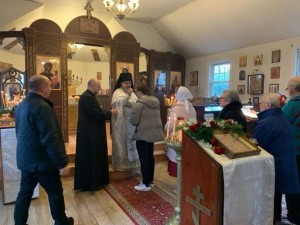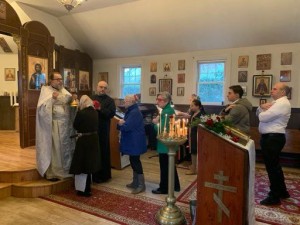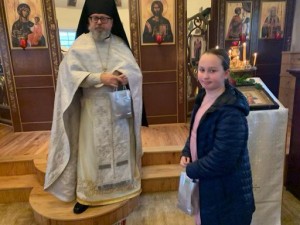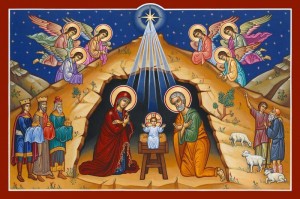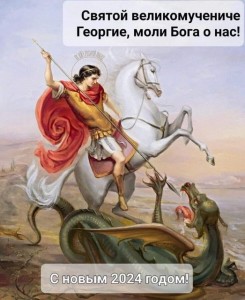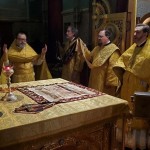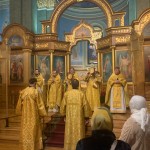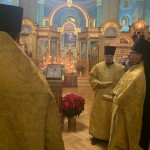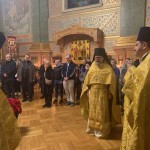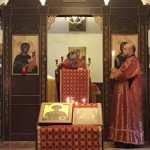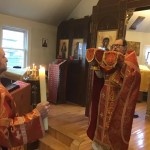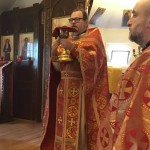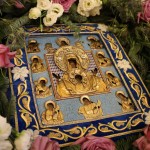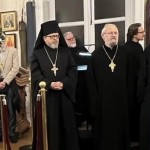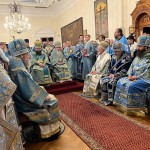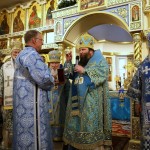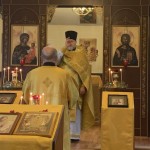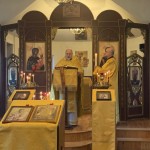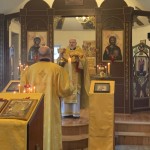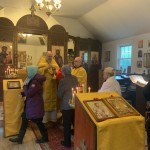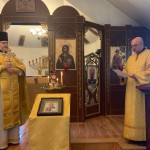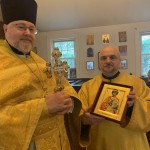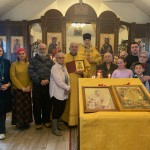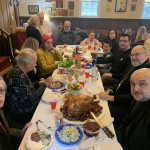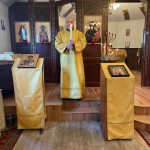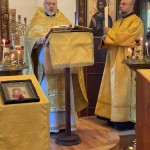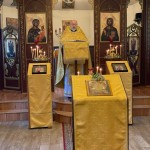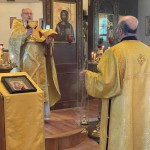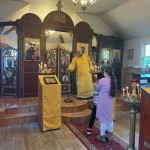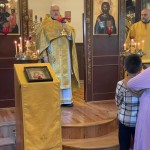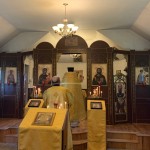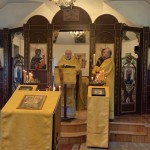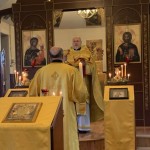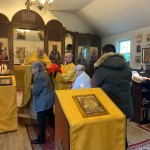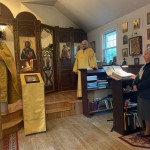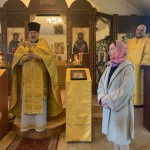On November 26, on the 25th Sunday after Pentecost, feast of St. John Chrysostom, our Parish family had a beautiful celebration. Our long-time pastor, Archpriest Igor Tarasov served the Divine Liturgy for the last time as the Rector of St. George. After the readings from the Sacred Scripture he addressed faithful with the following homily:
“Dear brothers and sisters in Christ! The message of today’s St. Paul’s Epistle lesson is about unity. St. Paul is writing to the Ephesians that they should live “endeavoring to keep the unity of the Spirit in the bond of peace” (Eph. 4, 3). He explains this unity saying that “there is one body and one Spirit… one Lord, one faith, one baptism; one God and Father for all” (Eph. 4, 4-6). So, today we will reflect on the unity. It is very important to be united. Perhaps every nation has proverbs, sayings or parables about the importance of unity. If a nation is united, it can overcome any powerful enemy. If a family is united, it can survive any crisis. Unity is an indispensable condition for a group of people to achieve success”.
“However, if we look at the way we, people, live and relate to each other, we may realize that unity is very desirable, but not often an existing thing. People are divided in many ways. They are conservative or liberal, Republicans and Democrats, pro-life and pro-choice, Christians and Jews, believers and atheists. To make the issue trivial, let us recall that we have different taste: “I like potato, you like tomato” and so on. People have differences. We are different in many ways. And in many instances it is totally appropriate to be different, to hold a distinct opinion or to like what somebody else does not like. God created us to be different, to be individual persons. But in some cases people need to be united. In some instances differences become very dangerous, if not fatal. If a boat is sinking, everyone should work together in order to be saved, cooperate with the captain and not express the differences. In such a situation differences in opinion as to what should be done may cost people lives”.
“This is the case when people are bound together in striving to achieve the goal of eternal salvation. Such a group of people is a community of believers called the Church. The Church has to be one, all members should be united by one goal, one way of life, one spirit. Although we are many different persons with many different thoughts, opinions and preferences, we have to share one nature in Christ. As St. Paul believes, this is a new nature uniting Christian community, so it has “one body and one spirit, one Lord, one faith, one baptism” (Eph. 4, 4-6). We have one God in whom we believe, one and only Savior, Jesus Christ whom St. Paul calls “one Lord”. In Baptism we all become able to partake of the same nature. We also become the followers of one teaching, and as St. Paul put it, “called in one hope” (Eph. 4, 4). These are the things in which we may not have differences. These are the points about which we may not argue. It would be improper or dangerous to argue about that. Therefore, St. Paul warned his spiritual children that they have to preserve unity in faith”.
“Speaking of these signs of unity St. Paul reveals us a mysterious reality of life of the Holy Trinity in the Church. He tells us about one God, one Lord and one Spirit, the Three divine Persons of the Trinity, God the Father, Son and Holy Spirit. He also combines one Baptism and the three virtues of faith, hope and love into one great reality. Each Person of the Trinity sanctifies us, but the sanctification is one, because our Baptism is one, and the grace of that Sacrament is one”.
“Therefore, dear brothers and sisters, we need to preserve the unity of faith. We cannot divide the body of Christ, the Church. We cannot separate ourselves from it. But there may be a question how this unity should appear. St. Paul describes it very briefly is “the unity of the Spirit in the bond of peace” (Eph. 4, 3). Should it be then a uniform group of people with the same views, customs and habits? Or, on the contrary, should it be a unity in diversity where each person or each particular group has certain distinctive features? Should it be a “melting pot” or a beautiful mosaic? This country, the United States, was first tending to be a melting pot for the nationalities joining here together, but later it began to consider itself rather a beautiful mosaic consisting of different ethnic and religious groups with their different customs, cultures and traditions. This kind of unity gives strength to this nation”.
“Same kind of unity should be preserved in the Church of Christ. Resembling the mysterious unity of the Three Persons in the Holy Trinity, the Church has different traditions, customs of the different nationalities who all united in the same Universal Church. We have such differences between the Greek and Russian Church. We have also some distinctions between each ethnic Orthodox community, between the Russians, Serbs, Ukrainians, Romanians and so on. But all of us united in the same faith, same Baptism, same hope to achieve salvation. The Church is not a melting pot. It is a unity in diversity”.
“Therefore, dear brothers and sisters in Christ, let us not forget one hope of our calling (Eph. 4, 4). Let us keep the unity of one faith, hope and love, the unity in one Spirit, one Lord and one Baptism, in “one God and Father of all, who is above all, and through all” (Eph. 4, 6).
During the Litany of Fervent Supplication, Fr. Igor proclaimed petitions of thanksgiving due to the last week’s celebration of the Thanksgiving Day, as well as his personal desire to thank the Lord for the long-time service at St. George.
During preparation for Holy Communion the choir nicely performed the Psalm 33.
After the Liturgy dismissal Fr. Igor made the announcements. He reminded the parishioners that in two days we begin the Nativity Fast, and advised them that the schedule of services for December is ready.
Fr. Igor also had a speech about his leaving our parish. He expressed his gratitude to the Lord and to our parishioners for the blessed 16 years of ministry at St. George. He mentioned that this tenure was the best in all his priestly service, although our parish is very small, and Fr. Igor’s other parishes were larger and more vibrant. He recalled the Saint celebrated on that day, John Chrysostom, who served in different places, was even persecuted but had always been grateful to God. His motto and his last words were, “Glory to God for everything!” Thus every Christian person should feel grateful to the Lord for everything he or she encounters in life. Thus, Fr. Igor said that he is grateful for everything he experienced during his ministry.
After the leaving Rector’s speech our temple’s Sacristan, Andrew Malyshev proclaimed the address of gratitude to Fr. Igor in English language. Then the address was also read by our Warden, Olga Roussanow, in Russian. As a token of appreciation, our parishioners presented Fr. Igor with a gift, an icon of our parish patron, St. George. A Polychronion was proclaimed to Archpriest Igor Tarasov. Then a group photograph was taken.
Our celebration and interaction continued at the luncheon held to mark past Thanksgiving Day, and in honor of Fr. Igor’s departure. Everybody enjoyed delicious meals, including the Thanksgiving conversation.

